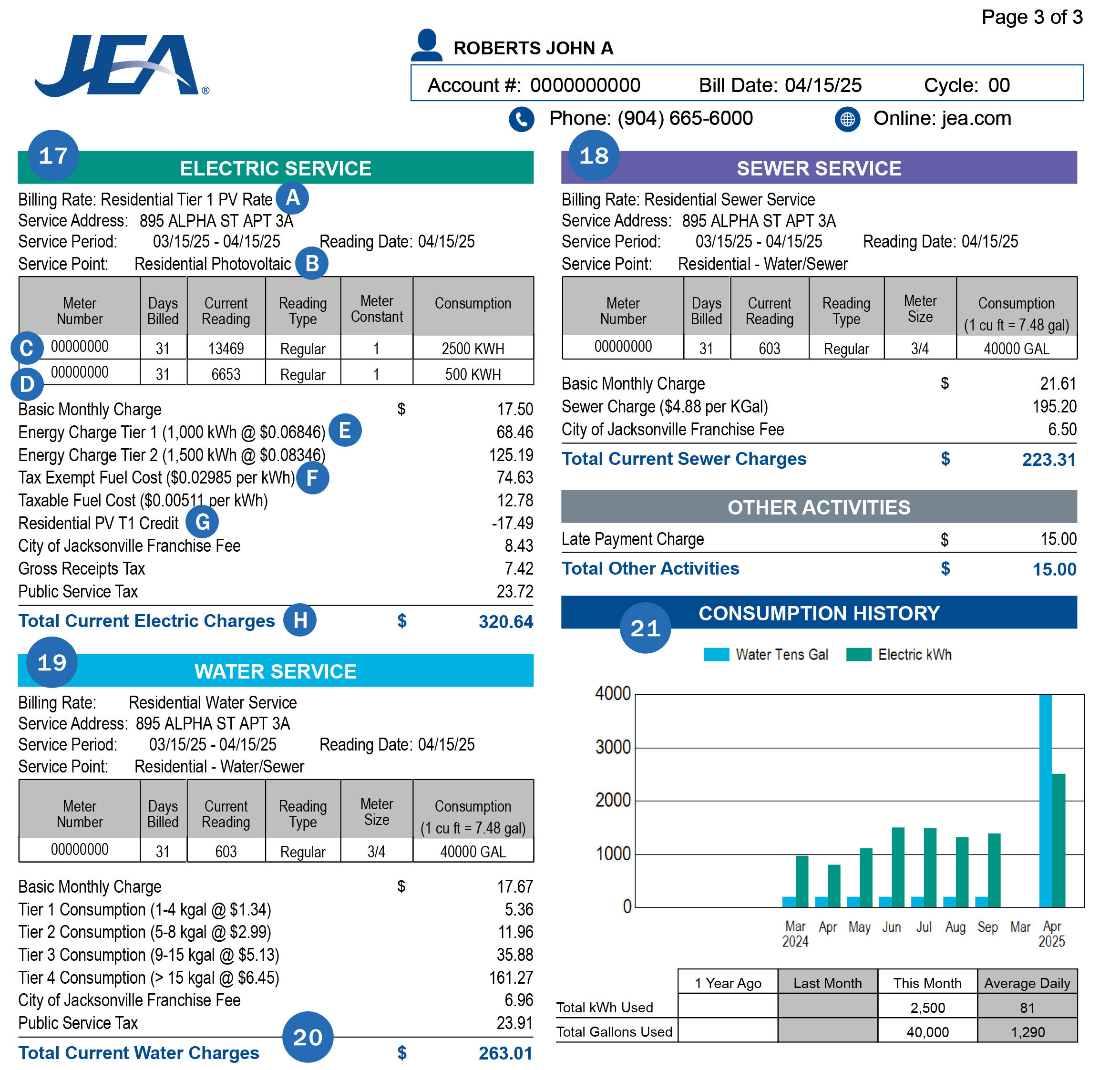Distributed Generation Bill Breakdown
We know understanding your distributed generation bill and the calculations on that bill is important to you. Unlike the JEA bill you might have received previously, a distributed generation bill shows the amount of energy JEA delivered to you and the amount of energy that JEA received from you.
IMPORTANT: The below sample bill includes elements based on new rate adjustments approved by the JEA board of directors on March 25, 2025, and effective April 1, 2025. Learn more at jea.com/value.
Page 1 of Bill (Front)
- Customer Name
- Account #: You’ll need your 10-digit account number to manage your account when contacting JEA.
- Cycle: JEA has 20 billing cycles. Each account is assigned to one of these cycles and is billed monthly.
- Bill Date: This reflects the date you are billed for your services.
- Total Summary of Charges: This section describes all the services you receive from JEA. A complete breakdown for each of these services is listed on page 3.
- Message Area: Check this space for important information about your account, money-saving tips and new product updates.
- Previous Balance: This reflects the amount that was due on your account last month.
- Payment(s) Received: This area reflects any payments received since your last bill.
- Balance Before New Charges: This reflects the difference between your previous balance and payments received since your last bill.
- New Charges: This reflects any charges that were posted to your account for the current month.
- Please Pay: This area reflects any past-due amount, as well as any new charges for the current month.
- Neighbor to Neighbor/Prosperity Scholarship Fund check box: Check this box if you'd like to donate to JEA's Neighbor to Neighbor | Fund or the Prosperity Scholarship Fund. Please be sure to fill in the amount(s) you would like to donate which will be added to your bill until you tell us you no longer wish to contribute.
- Total Current Electric Charges: Change of Address box: Check here to update your address, phone number or email address. Then complete the form on page 2 with your new information.
Page 2 of Bill (Back)
- Statement Information: These are definitions of the line items found in the details section of your bill for each type of service.
- Onserts: Learn more about ways to save on your utility bill and special JEA programs. Many feature QR codes that you can scan and view on jea.com.
- Address Correction: Complete this form if you have a new address, phone number or email address. Remember to check the corresponding box on the payment coupon (page 1).
Page 3 of Bill (Front)
- Electric Service: This section offers a detailed breakdown of your electric service charges, including taxes and fees.
- Billing Rate: All PV (Photovoltaic) customers will be assigned to a PV Billing Rate. PV Billing Rates allow customers to receive PV credits if applicable.
- Service Point: A Photovoltaic Service Point indicates the meter is a PV meter. A PV meter records the kWh being sent to and from the home.
- First Meter Number: The amount of electricity that JEA delivered to power your home is the total # of kWh you "bought" from JEA during the billing period.
- Second Meter Number: The amount of electricity that JEA received from your PV system is the total # of kWh you "sold" to JEA during the billing period.
- Energy Charge: The energy charge is calculated by multiplying the kWh you purchased from JEA by the energy charge which can be found at: jea.com/my_account/rates.
- Fuel Charge: The fuel charge is calculated by multiplying the # of kWh you purchased from JEA by the tax exempt and taxable fuel rates. The total monthly fuel rate is the combination of the tax exempt and taxable fuel rates.
- Residential PV Credit: The PV Credit is calculated by multiplying the # of kWh a customer sends to JEA's grid during a billing period by JEA's fuel cost.
- Total Current Electric Charges: This amount is the total amount due to JEA for electric services. This amount is calculated by adding all of the charges, fees, and taxes and subtracting the PV credit.
- Sewer Service: This section offers a detailed breakdown of your sewer service charges, including taxes and fees.
- Water Service: This section offers a detailed breakdown of your water service charges, including taxes and fees.
- Other Activities: If your bill includes other charges, you’ll find a description of them in this section.
- Consumption History: Our color-coded bar graph gives you a breakdown of your last 13 months of consumption. The chart below it shows your consumption one year ago, last month, this month, and the average amount(s) used daily.
For More Information
- If you have questions about a specific charge on your bill contact us.
- The monthly fuel rate table can be found online at jea.com/rates.
Explore Solutions and Save
}
/uploadedImages/ResidentialDoMoreAd.jpg
Learn about all the ways JEA helps Northeast Florida families, businesses and our community thrive and how we can help you do more.


